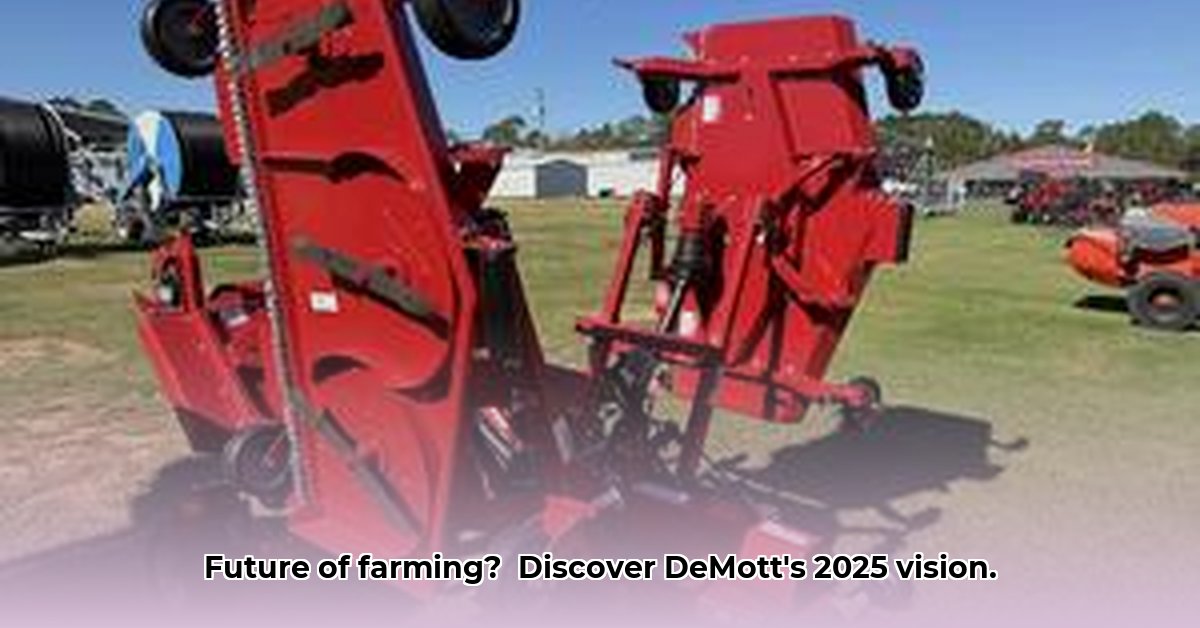
DeMott Tractor Co.: A Legacy Redefined for Sustainable Agriculture
DeMott Tractor Company Inc., a cornerstone of Moultrie, Georgia's agricultural landscape, faces a pivotal moment. For decades, they've served farmers with traditional equipment and unparalleled expertise. However, the agricultural sector is undergoing a dramatic shift towards sustainable practices, creating both challenges and exceptional opportunities for DeMott. This report analyzes DeMott's current position, explores the burgeoning market for sustainable agricultural equipment, and offers a strategic roadmap for embracing this transformative change. The goal? To ensure DeMott's continued success and leadership within a rapidly evolving industry.
Assessing DeMott Tractor Co.'s Current Standing
DeMott Tractor Co. enjoys a strong reputation built on decades of service to the Moultrie farming community. Their established customer relationships and deep understanding of traditional farming needs provide a solid foundation for future growth. While their website 1 highlights customer service and equipment offerings, a more prominent focus on sustainable practices is needed to attract the growing number of environmentally conscious farmers. This represents a key area for improvement and innovation. How can DeMott leverage its existing strengths to capitalize on this emerging market segment?
The Sustainable Agriculture Equipment Market: A Landscape of Opportunity
The demand for sustainably produced food is accelerating, driven by environmentally conscious consumers and the urgent need for responsible agricultural practices. This translates into a burgeoning market for sustainable agricultural equipment. Technologies like precision farming tools (GPS-guided machinery), water-efficient irrigation systems, and renewable energy-powered farm equipment are rapidly gaining traction. This shift creates a significant opportunity for businesses like DeMott to expand their offerings and cater to the evolving needs of farmers. Can DeMott effectively bridge the gap between traditional practices and the demands of sustainable agriculture?
Strategic Recommendations for DeMott Tractor Co.: A Path to Sustainable Success
To successfully transition to a sustainable agriculture focus, DeMott needs a multi-phased strategy:
Phase 1: Market Understanding & Strategic Partnerships (0-6 Months)
- Conduct Thorough Market Research: DeMott must gauge local farmer interest in sustainable technologies. Targeted surveys, focus groups, and farmer interviews will provide crucial data on needs and preferences. What specific sustainable technologies are most attractive to local farmers? This information is essential for informed decision-making.
- Forge Strategic Partnerships: Collaborating with suppliers of sustainable agricultural equipment provides access to cutting-edge technology and reduces market entry barriers. Which suppliers align best with DeMott's values and customer base? These partnerships will significantly improve market access.
Phase 2: Team Empowerment & Targeted Marketing (6-12 Months)
- Invest in Staff Training: Equipping DeMott’s staff with expertise in sustainable farming practices and technologies is vital. Comprehensive training programs will ensure effective customer support and build confidence in promoting new solutions. How can DeMott ensure staff competency in selling and servicing this new equipment? This training investment yields significant returns in expertise and customer trust.
- Develop Targeted Marketing Campaigns: Create marketing materials emphasizing DeMott's commitment to sustainable farming and the long-term benefits of environmentally friendly equipment. How can DeMott's marketing message highlight the value proposition for environmentally aware farmers? This focused marketing will attract a new customer base.
Phase 3: Financial Solutions & Expanded Services (12-24 Months)
- Explore Financing Options: To make sustainable equipment more accessible, DeMott should explore flexible financing options, potentially working with government agencies offering subsidies for sustainable agriculture investments. What financing packages will make sustainable equipment financially feasible for local farmers? This critical step unlocks market potential.
- Expand Service Offerings: Beyond equipment sales, DeMott could offer consulting services on sustainable farming practices. This value-added service positions them as trusted advisors and builds stronger customer relationships. How can DeMott establish itself as a leader in sustainable farming expertise? This positioning strategy expands market reach and builds brand loyalty.
Conclusion: Embracing a Sustainable Future
By implementing this strategic roadmap, DeMott Tractor Co. can position itself as a leader in sustainable agriculture, boosting market share and building a stronger reputation. The transition requires proactive adaptation, but the rewards—a more resilient business and a positive impact on the environment—are substantial. The future of agriculture is sustainable, and DeMott has the opportunity to be at the forefront of this vital change. Further research into the specific needs and adoption rates of sustainable technologies within the Moultrie farming community further strengthens this transition.